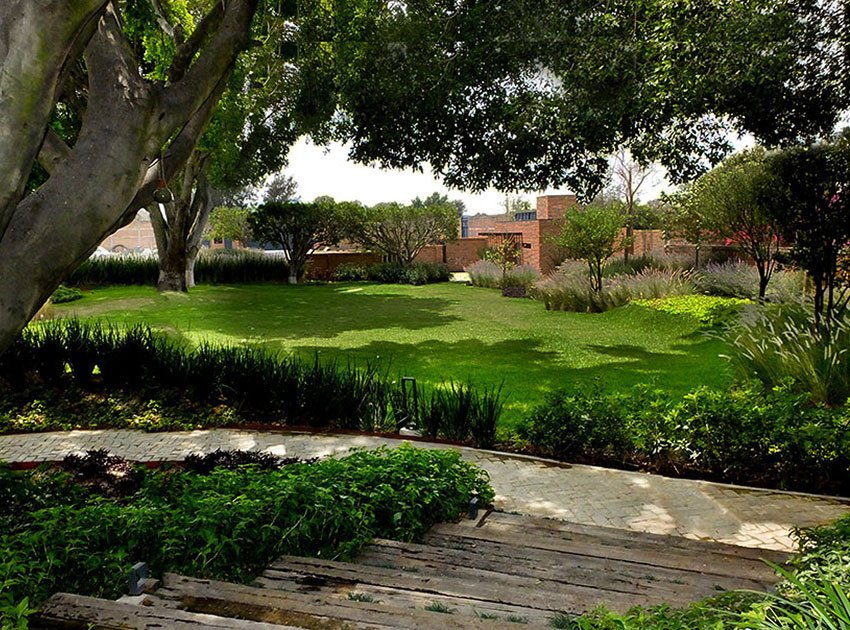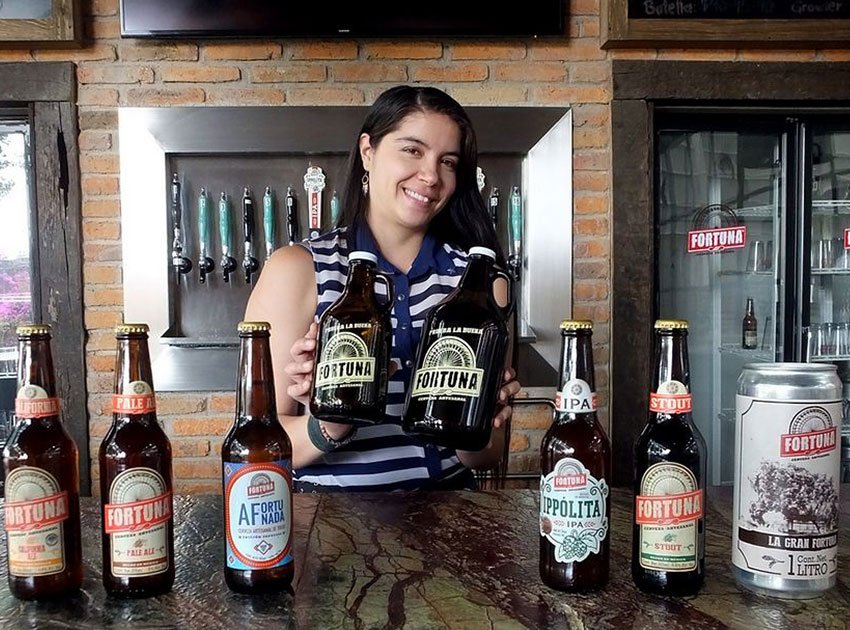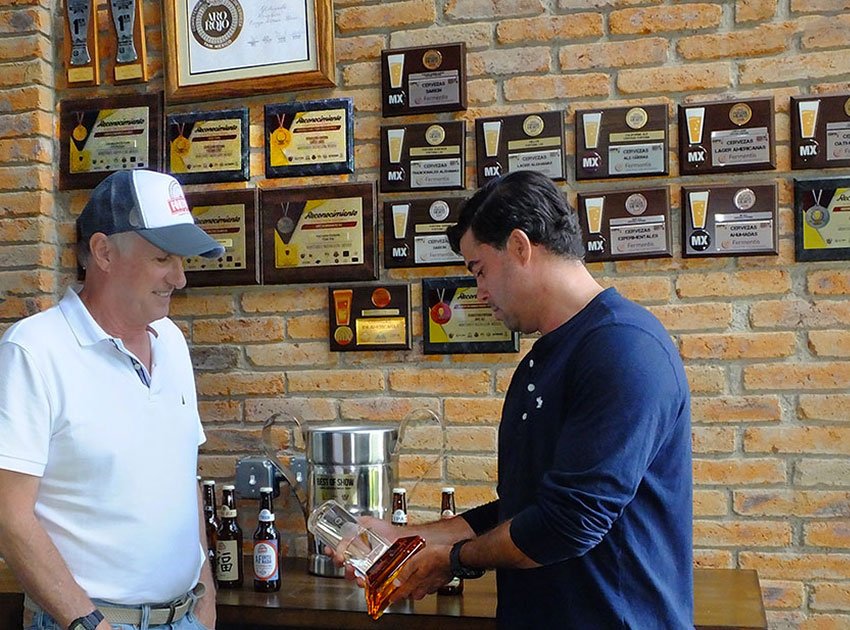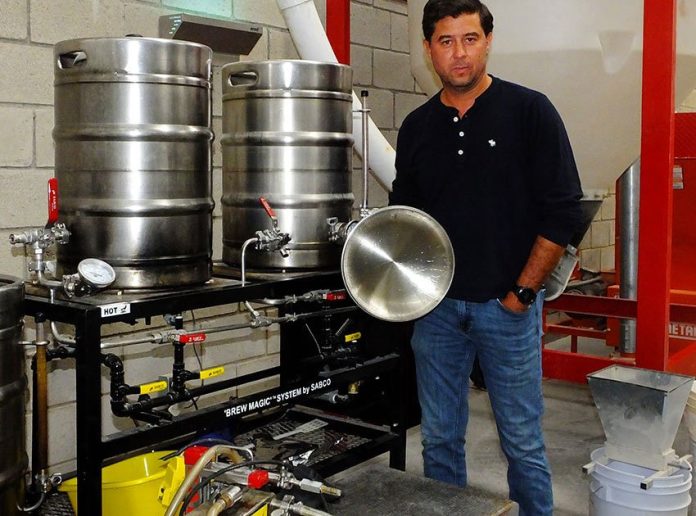In April of this year, 265 breweries from 14 countries entered their finest beers in the second Aro Rojo International Beer Contest held in Tampico on Mexico’s northeastern coast.
This year the prize for Mexico’s best brewery was awarded to Cervecería Artesanal Fortuna, located on the outskirts of Guadalajara, Jalisco. Two of Fortuna’s beers — in a tough competition with 1,200 others — ran away with gold medals.
By pure chance, Fortuna is located only seven kilometers from my door, so I decided to pay them a visit, first to taste their beer and secondly to see if I could discover just what has made them so successful.
I was born in Milwaukee, once famous for its beers. When I moved to Mexico, I happily found beers just as good as those in my old hometown and several much better.
Noche Buena and Negro Modelo were dark beers I especially appreciated, but for many years they were hard to find as the whole country was in the grip of a few powerful breweries that forbade the sale of competing beers in their territories.

I remember when — in all of western Mexico — the only place you could find Cerveza León was in the refrigerator of a meat packer who happened to be from Yucatán, where León is made, and who would occasionally drive a few six-packs on a 2,000-kilometer journey to his store in a country town outside Guadalajara.
Then a beer revolution took place. Microbreweries popped up here and there in Mexico, offering competition where there was none before. To my amazement, I was even able to find Mexican stouts that could give Guinness a good run for their money. From that point on, the number of microbreweries in Mexico began to grow exponentially and today there are around 800 of them.
Cervecería Fortuna is located at the edge of the huge Primavera Forest, a flora and fauna sanctuary popularly called “The Lung of Guadalajara.” Upon my arrival, I was greeted by Juan José Morales, director of the brewery and one of the four founders of Fortuna. I asked him how they got started.
“It all began during a trip to California,” Morales told me. “We tried an ale there that was simply out of this world. We were familiar with ale made by Mexican microbreweries, but what we found in California was far superior and we wondered why.”
Morales and friends investigated and came to the conclusion that the secret of making perfect ale was to use nothing but the four classic ingredients of beer: malt, hops, water and yeast, adding no preservatives. “On top of that,” added Morales, “we don’t pasteurize our beer. When you pasteurize, you lose 30% of your freshness and aroma. Instead we follow a very strict regimen for keeping it refrigerated, from the moment it’s bottled here at our plant until it’s poured into your glass. We aim to be the very best in Mexico for quality.”
Morales suggested I take their standard tour of the brewery and then come to him for answers to any questions I might have.

The tour of the brewery lasted just over an hour. The place is gleaming and the equipment is ultra-modern, with LED screens flashing left and right. Nevertheless, the tour is very personalized, allowing you to smell, touch and taste the barley and hops and get a good look at every step that transforms them into the products that are eventually stored in a huge cold locker whose temperature is maintained at exactly 11 C.
Along the way, I met Fortuna’s braumeister, Marcelo Oehninger, who described himself as a “Swiss Chileno.” He is, I discovered later, one of very few brewmasters in Mexico fully trained and certified in Germany.
After my tour, I caught up with Juan José Morales in front of a wall covered with medals and awards many of which, I learned, Fortuna had won just in the last few weeks.
One of their top winners is Cañita, a beer they recently added to their line. “We wanted to make a lager beer,” Morales told me, “but we wanted it to be something really special. You won’t believe it, but it took us two years to find a formula that we really love.”
Cañita, you could say, is Fortuna’s answer to Corona, and, after tasting it, I think Corona had better watch out!
“But we also like to make really creative beers here,” Morales told me, “beers that no one else has ever made, beers with our own special Mexican ingredients. A few years ago I bought some sake yeast with the idea of actually trying to make sake here, but my brewmaster said that would introduce bacteria that would contaminate the factory. ‘Instead of that, how about making a beer?’ he suggested.

“Okay, I said, let’s try. So we brought in rice, malt and Japanese hops and experimented and came out with a Mexican-Japanese beer we call Sake Ale and it’s creating quite a stir and starting to win awards. Now all the Japanese restaurants in Guadalajara are looking for it!”
Fortuna now has nine beers in their line and, yes, they are looking into even more “beers that no one else has ever made.” However, Juan José Morales observed that “Once you have a good product, next you must give your customers the very best service possible, so this has become our main focus.”
The Fortuna brewery also has a huge beer garden which can accommodate up to 200 people. The garden really is special. Huge Indian laurels provide shade for paths lined with aromatic plants like rosemary and mint.
At the bar I had a chance to try several of their craft beers. I was especially impressed by their IPA (India Pale Ale), which is brewed with an unusually large amount of hops, a formula developed by the British to preserve their beer during the long hot voyage from England to India.
I was amazed. I found this and several other of their ales delicious. I could taste different subtle flavors in each, which I might imagine came from spices, but I knew nothing had been added. I must mention that up to this moment I was not a fan of ales, but Fortuna’s have totally captivated me.
I guess I experienced just what the company’s four founding fathers felt when they tried craft ale in California and decided to bring it to Mexico.
[soliloquy id="82019"]
If you live in the Guadalajara area, you might want to visit Fortuna to take a tour or pick up a mix of their most popular beers. Check their web page for details.
Anywhere else in the country, you can taste their products by ordering them from Amazon México. And don’t forget: it’s not pasteurized, so the shelf life is only six months. Keep it nice and cold!
The writer has lived near Guadalajara, Jalisco, for more than 30 years and is the author of A Guide to West Mexico’s Guachimontones and Surrounding Area and co-author of Outdoors in Western Mexico. More of his writing can be found on his website.
